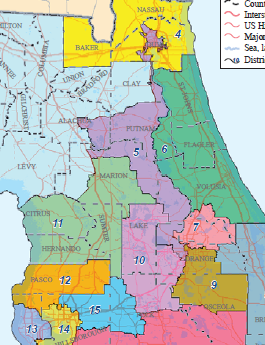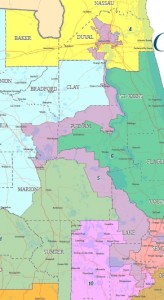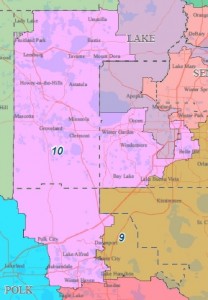The Supreme Court has posted the audio files for the Williams-Yulee v. Florida Bar case at this site.
Williams-Yulee v. Florida Bar heard by U.S. Supreme Court
The audio recording of the argument in Williams-Yulee v. Florida Bar, regarding whether Florida’s rule of judicial conduct that prohibits candidates for judicial office from personally soliciting campaign funds violates the First Amendment, won’t be posted until the end of the week, but SCOTUSblog has two pieces that provide insight into the proceedings:
- Argument analysis: Running for a court seat, tin cup in hand?
- Justices debate limits on solicitations by judges: In Plain English
U.S. Supreme Court to hear case on campaign fundraising limits imposed on Florida judicial candidates
On Tuesday, January 20, 2015, the United State Supreme Court will consider, in the case of WILLIAMS-YULEE V. FLORIDA BAR, whether Florida’s rule of judicial conduct that prohibits candidates for judicial office from personally soliciting campaign funds violates the First Amendment to the United States Constitution.
On May 1, 2014, the Florida Supreme Court approved a referee’s findings of fact and recommendation that a judicial candidate be found guilty of violating Rule Regulating the Florida Bar 4-8.2(b) (Judicial and Legal Officials, Candidates for Judicial Office; Code of Judicial Conduct Applies) for personally soliciting campaign contributions in violation of Canon 7C(1) of the Florida Code of Judicial Conduct and rejected the judicial candidate’s constitutional challenge to the ban imposed by Canon 7C(1) on a judicial candidate’s personal solicitation of campaign contributions. The Florida Supreme Court held that the Florida Judicial Canon is constitutional because it promotes the State’s compelling interests in preserving the integrity of the judiciary and maintaining the public’s confidence in an impartial judiciary, and that it is narrowly tailored to effectuate those interests. This case dates back to a 2009 fundraising letter that was signed by the judicial candidate.
Florida’s rules for judicial elections prohibit judges from personally soliciting campaign funds and instead permit judicial candidates to establish committees to make such solicitations.
Coverage and commentary on the case:
New districts adopted – litigation continues
Here is a link to the Senate analysis of the newly adopted Congressional districts for Florida, including maps of the before and after the changes.

Court finds Florida Congressional Redistricting Map to be Unconstitutional
A Leon County Circuit Court judge issued a final judgment in the cases of Romo v. Detzner & Bondi and The League of Women Voters of Florida, et al. v. Detzner finding “that districts 5 and 10 were drawn in contravention of the constitutional mandates of Article III, Section 20, thus making the redistricting map unconstitutional as drawn.”
The extensive docket of the case is online, you will likely need to scroll down to “2012 CA 000412: Romo, Rene vs Scott, Rick.”
The map of District 5 is highlighted below:
The map of District 10 is highlighted below:
The maps are published online by the Florida Senate.
The provisions of the Florida Constitution at issue were Article III, Sections 20 and 21, related to redistricting.
- New York Times article
- Tampa Bay Times article – reaction from the District 5 officeholder
- Miami Herald article
- POLITICO article
11th Circuit Court of Appeals: 2012 Florida Voter Purge violated NVRA
A three judge panel of the United States Court of Appeals for the Eleventh Circuit has concluded that Florida’s 2012 effort to remove ineligible voters was “an attempt to systematically remove names from the voter rolls in violation of the 90 Day Provision” contained in the National Voter Registration Act, 42 U.S.C. § 1973gg-6(c)(2)(A).
This order reverses the holding reported on this blog back in October, and comes after the State has apparently suspended their current systematic removal program.
Federal District Court holds that NVRA does not limit Florida purge
A Federal District Court Judge in South Florida has issued an order in the case of Arcia, et al. v. Detzner (posted online by the Moritz College of Law at the Ohio State University) denying the Plaintiffs’ request for an injunction and summary judgment and held that the National Voter Registration Act of 1993 (NVRA) does not limit the State of Florida from attempting to purge ineligible non-citizen voters within 90 days of an election. The issue of the NVRA’s limitation on voter list maintenance programs was raised by various civil rights groups and the U.S. Department of Justice.
From the order:
“Certainly, the NVRA does not require the State to idle on the sidelines until a non-citizen violates the law before the State can act. And surely the NVRA does not require the State to wait until after that critical juncture——when the vote has been cast and the harm has been fully realized——to address what it views as nothing short of “voter fraud.”
“By creating two distinct subsections, Congress meant to differentiate the removal of once eligiblevoters from those who were never eligible in the first instance. Finally, subsection (b) is consistent with Congress’ finding that “the right of citizens of the United States to vote is a fundamental right” and one of the purposes of the NVRA is “to ensure that accurate and current voter registration rolls are maintained.” § 1973gg(a)(1), (b)(4) (emphasis added).”
“It must follow that subsection (b) was meant to apply to programs aimed at removing those voters whose status as registered voters was void ab initio. See also United States v. Florida, 2012 WL 2457506, at *4 (holding that pursuant to subsection (b), and in regard to “non-citizens, the state’s duty is to maintain an accurate voting list. . . . But the NVRA does not require a state to allow a non-citizen to vote just because the state did not catch the error more than 90 days in advance.”)”
“Indicative Ruling” issued by Federal Court on HB1355 voter registration rules
The U.S. District Court in Tallahassee has issued a “Indicative Ruling on the Motion for a Permanent Injunction” regarding the challenged filed against Florida’s HB1355 limits on voter registration activities. (Document courtesy of The Brennan Center)
Quotes from the Federal Preclearance Opinion
As I wrote about earlier today, the U.S. District Court for the District of Columbia issued any order precleared one section of HB1355 (regarding voters who had moved within the State) but not precleared the change to early voting days (though it did telegraph to the State how it could be precleared).
The Court also included the following analysis of some of the State’s arguments:
- Florida’s proposed interpretation of the effect test would thus mean that section 5 could not prevent the adoption of modern-day equivalents of Jim Crow-era voting laws. To state that proposition is to refute it.
- Voting is a fundamental right, “preservative of other basic civil and political rights,” Reynolds v. Sims, 377 U.S. 533, 562 (1964), and no amount of voter disenfranchisement can be regarded as “de minimis.”
- Further, as we explain in more detail in the course of our discussion of specific voting changes, see infra Part II.B.1, we disagree with Florida’s position that a change is not retrogressive if it affects “in the aggregate significantly more [w]hites than minorities.” Fla. Br. 53 (emphasis added). Focusing on the effects of voting changes in absolute terms would mean that almost no ballot access change would be considered retrogressive; after all, the fact that fewer members of a particular group are present in the overall electorate is part of what it means to be a minority group. Applying the effect test in the manner Florida suggests would thus allow covered jurisdictions to enact changes with clearly adverse effects on minority voters so long as more white voters were also affected. That approach would fly in the face of the Voting Rights Act’s primary goal of protecting minority voting populations. The retrogression assessment must therefore be conducted in relative terms, with reference to the proportions of each group affected by the change.
- Although we have concluded that we cannot preclear Florida’s early votingchanges at this time because those changes authorize the covered counties to offer a statutory minimum number of hours that may result in retrogression, it is possible that the counties will instead, as Florida predicts, opt to provide substantially more hours than that minimum. As we discuss below, under at least one such scenario we are persuaded that Florida would likely satisfy its burden of showing a nonretrogressive effect: that is, if the covered counties were to provide the maximum authorized 96 hours on a standard 7 a.m. to 7 p.m. schedule. When a court finds that it cannot preclear one iteration of a submitted plan, but may be able to preclear a modified version, the Supreme Court has expressed
approval for issuing a kind of “conditional order” indicating the circumstances under which approval may be obtained. See, e.g., City of Port Arthur, 459 U.S. at 167-68 (expressing approval of the district court’s “conditional order” denying preclearance of the expansion of a city’s borders unless the city agreed to eliminate a majority-vote requirement for certain elections); City of Richmond, 422 U.S. at 370 (stating that the district court in City of Petersburg, 354 F. Supp. 1021, “was correct in conditioning approval of the annexation upon the adoption of the plan to elect councilmen by wards”). We do so here.
-
In sum, the record evidence persuades us that, if the covered counties offer the maximum available early voting hours each day on a standard 7 a.m. to 7 p.m. schedule, the negative effect of reducing the number of days from 12 to 8 would likely be offset by the ameliorative effects of adding non-working weekday hours, a Sunday, and additional weekend hours.
Federal court rejects DOJ restraining order request related to Florida voter purge
Ruling from the bench, numerous media outlets are reporting the Federal judge handing the U.S. Department of Justice’s challenge to Florida’s voter purge and its compliance with the National Voter Registration Act (NVRA) has rejected the DOJ’s request for a restraining order.
The Judge apparently relied on the state’s claim that the purge effort had stopped for now and his interpretation that the NVRA prohibition on systematic removal of voters close to an election did not apply to the systematic removal of noncitizens. The Miami Herald has the details.


